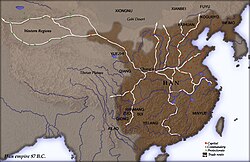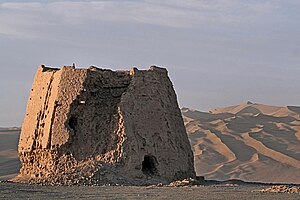User:Kamek98/Deadliest Histories I/Yellow Turban Rebellion prelude

Under Liu Bang, the Han had defeated Xiang Yu and the Western Chu at the Battle of Gaixia.[1] As a result, the Han had gained total control over China.[2] Liu Bang (劉邦) became the first Emperor of the Han Dynasty.
Liu Bang, also commonly known as Emperor Gaozu of Han, only ruled from 202 BCE to 195 BCE.[3] His predecessor was Liu Ying (劉盈), Emperor Hui of Han. Emperor Hui ruled until 188 BCE and he was succeeded by Liu Gong (劉恭), Emperor Qianshao of Han. Emperor Qianshao's reign was even shorter; he only ruled for four years. His reign came to an end in 184 BCE. He was succeeded by Liu Hong (劉弘), Emperor Houshou of Han. He, too, only ruled as emperor for four years. Emperor Houshao's reign lasted until 180 BCE. His successor was Liu Heng (劉恆), Emperor Wen of Han. Emperor Wen reigned until 157 BCE. He was succeeded by Liu Qi (劉啟), Emperor Jing of Han.[4] He crushed the Rebellion of the Seven States during his reign. His successor was Liu Che (劉徹), Emperor Wu of Han. Emperor Wu managed to rule for a long period of time, stretching from 141 BCE to 87 BCE.[5] His son, who succeeded him at the age of 8, was Liu Fuling (劉弗陵), Emperor Zhao of Han. His rule ended in 74 BCE and he was succeeded by Prince He, who only sat the throne for 27 days. He was deposed and replaced by Liu Xun (劉詢), Emperor Xuan of Han. He was succeeded by Liu Shi (劉奭), Emperor Yuan of Han. His successor was Liu Ao (劉驁), Emperor Cheng of Han. His successor was Liu Xin (劉欣), Emperor Ai of Han. He ruled until 1 BCE and was succeeded by Liu Jizi (劉箕子), Emperor Ping of Han. Emperor Ping was the last of the Han emperors to rule in the BCE and he was also the first to rule in the Common Era, reigning from 1 BCE to 5 CE. His successor was Emperor Ruzi of Han. His reign started in 6 CE and ended in 9 CE. After his reign, the Han reign came to a temporary end. This group of Han emperors were the emperors of the Western Han Dynasty.
The man who seized the Han throne and established the Xin Dynasty was Wang Mang (王莽). His reforms foreshadowed socialism.[6] Wang Mang was defeated at the Battle of Kunyang in 23 CE.
The Xin crumbled as well. The Liu clan had taken the throne once again with Liu Xuan (劉玄), Emperor Gengshi of Han on the throne. He was replaced by the puppet emperor Liu Penzi (劉盆子). These two emperors were not recognized as emperors of the Eastern Han Dynasty. Instead, the Eastern Han Dynasty was founded by Liu Xiu (劉秀), Emperor Guangwu of Han following the Red Eyebrows Rebellion. Emperor Guangwu's reign came to an end in 57 CE. His successor was Liu Yang (劉陽), Emperor Ming of Han. Liu Da (劉炟), Emperor Zhang of Han succeeded Emperor Ming. Under Emperor Zhang's reign, the general Gan Chao was able to push the Xiongnu people further west during their military response to the Xiongnu's mischief dealing with the present-day Silk Road. Liu Zhao (劉肇), Emperor He of Han succeeded Emperor Zhang. Liu Long (劉隆), Emperor Shang of Han succeeded Emperor He. Liu Hu (劉祜), Emperor An of Han succeeded Emperor Shang. Liu Yi (劉懿), the Marquess of Beixiang succeeded Emperor An. He was perhaps in his infancy during his short reign. He died in 125 CE and was succeeded by Liu Bao (劉保), Emperor Shun of Han. His reign ended in 144. His successor, Liu Bing (劉炳), Emperor Chong of Han was less than three when his reign ended upon his death in 145. Emperor Chong's cousin Liu Zuan (劉纘), Emperor Zhi of Han was also young when he was placed on the throne.

Perhaps it was during Emperor Zhi's reign when then court began to first crumble. Liang Ji, a general and the brother of the Empress Dowager Liang, retaliated against Emperor Zhi for rude remarks. Liang Ji had poisoned the emperor.
Liu Zhi (劉志), Emperor Huan of Han was installed into the throne by Liang Ji and the Empress Dowager on the 1 August 146.[7]
References[edit]
- ^ Mark, Joshua J (12 December 2012). "Battle of Gaixia". Ancient History Encyclopedia.
{{cite web}}: Missing or empty|url=(help) - ^ The Art of War: The Book of Lord Shang
- ^ "4.3 Rise of the Han". Indiana University. Spring 2010.
{{cite web}}: Missing or empty|url=(help) - ^ Melton, J. Gordon (2014). Faiths Across Time : 5,000 Years of Religious History. Santa Barbara: ABC-CLIO. ISBN 1610690265.
- ^ "Han Wu Ti". Dictionary.com. Retrieved 16 January 2015.
- ^ Dash, Mike (December 9, 2011). "Emperor Wang Mang: China's First Socialist". Past Imperfect blog. Smithsonian magazine. Retrieved 9 January 2014.
- ^ deCrespigny, Rafe. Emperor Huan and Emperor Ling.
